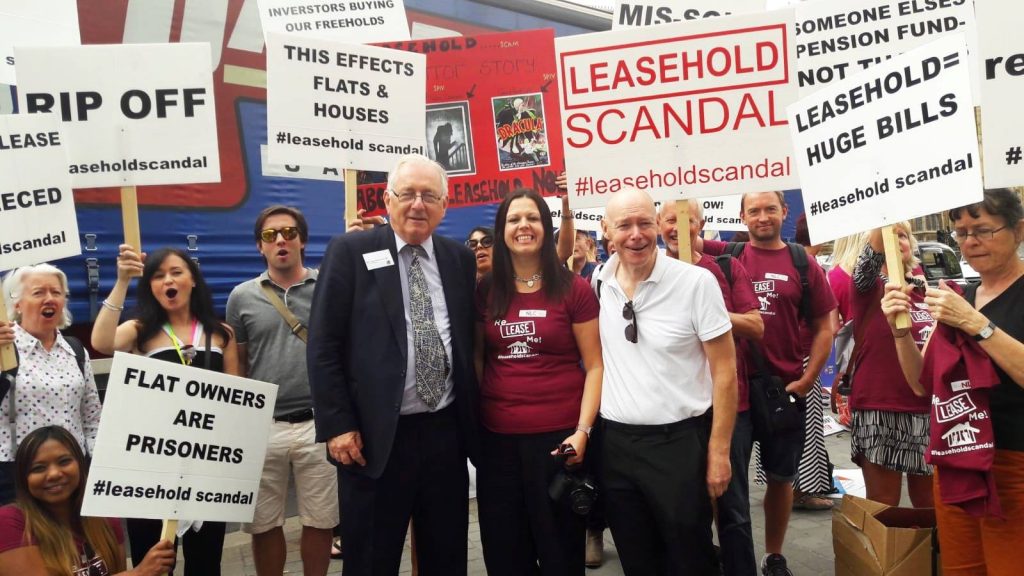
Sir Peter Bottomley, Katie Kendrick, co-founder of National Leasehold Campaign and Sebastian O’Kelly, of LKP.
Missing: Martin Boyd, Cath Williams, Joanne Darbyshire and Louie Burns
The Leasehold Knowledge Partnership feels its long campaign against the mis-selling of leasehold properties with aggressive ground rents has been spectacularly vindicated today by the Competition and Markets Authority.
The CMA is going straight for enforcement against plc housebuilders for dumping their customers into rip-off homes, coaxing them into using stooge solicitors who did not point out onerous terms and then flogging off the freeholds to predatory speculators, who rack up permission fees under the leases.
The CMA dismisses efforts by developers such as Taylor Wimpey and Countryside Properties plc – the main offenders in selling 10-year doubling ground rents – to offer “ground rent review schemes” to vary leases to RPI.
“We have significant reservations about Retail Prices Index (RPI) linked increases to ground rent,” says the CMA.
LKP has criticised the schemes as secretive and are only open to consumers who contact the company.
Speculators in residential freeholds have also agreed to vary doubling leases to ones linked to RPI, such as Long Harbour.
“The CMA is preparing to take enforcement action in relation to two key issues. First, to tackle certain instances of mis-selling of leasehold property.
“Second, to address the problems faced by homeowners from high and increasing ground rents.”
The CMA openly and bluntly supports the government declaration that new ground rents be banned.
Against housebuilders claiming that ground rents are essential for a scheme’s viability – an argument made by retirement housebuilders and accepted by government – the CMA declares:
“In what has been termed ‘modern leasehold’ housing ground rent is not legally necessary for there to be a valid lease. Nor have we seen persuasive evidence that it is commercially necessary.”
The CMA estimates that between the year 2000 and 2018 approximately 778,000 leasehold homes were sold. This is 42% of the market (36% of which were flats and 6% were houses).
But in a section which could be applied to those leaseholders caught up in the cladding scandal, the CMA says:
“It is a real concern that homeowners who have entered into a lease are captive consumers with very little influence over the costs incurred by landlords or their managing agents that will in due course be passed on to them.”
The CMA doesn’t appear to be impressed by the conveyancing solicitors, almost always recommended by the housebuilders:
“We are concerned that checks and balances that ought to have operated to draw attention to changes in ground rent and their consequences did not prevent problems arising.
“While the negative consequences of these practices are unlikely to have been foreseen by individual consumers the same cannot be said for companies selling leasehold properties.
“The CMA is concerned that the executive and non-executive directors of several house-builders did not steer their organisations away from such practices, which have had, if nothing else, adverse reputational
consequences for them, and which in turn raises concerns about the adequacy of their governance arrangements.”
The CMA has noted Persimmon allowing customers duped into leasehold houses to buy their freeholds in South Wales, after Cardiff City Council and Trading Standards:
“Cardiff City Council were generous with their time in helping us to understand their recent litigation against Persimmon.”
LKP obviously did an excellent job in discrediting new build leasehold houses.
From 1995 to 2009, only 5% of new build transactions were leasehold houses. This doubled between 2015-2017, but collapsed after 2018. Most of this rubbish was built in the North:
Overall about 778,000 new-build residential long leasehold homes were sold between 2000 and 2018.
“Of the total new-build leasehold house transactions during 2000 – 2018, 76% of sales have been in either the North West (61%), North East (8%) or Yorkshire and the Humber (7%).”
From April 2013 many were bought with the Help-to-Buy equity loan scheme was launched in England in April 2013, allowing purchases with only a 5% deposit.
Between its start in 2013 and March 2019, 221,000 properties have been purchased under the scheme, rising from approximately 20,000 per year in 2014 to just over 50,000 per year in 2019.
The CMA has heard “very serious allegations of mis-selling have repeatedly been made by homeowners about the conduct of developers and their sales staff in the process leading to the reservation agreement”.
These included: not being told the house was leasehold; that the house was a “virtual freehold”; and that they were given “unrealistically low estimates of the freehold purchase price” at a future date.
In addition:
“Purchasers were told that no houses would be sold freehold on an estate, only for houses to subsequently be sold freehold and sometimes for the same price as a leasehold.”
The report even makes a passing reference to “fleecehold”: freehold homes where estate charges apply: it has become another tradable asset created by our oligopoly housebuilders.
“As the CMA’s Chairman, Lord Tyrie, has said, the CMA will in due course consider whether to investigate freehold mis-selling, assessing the matter against its prioritisation principles.”
Clive Betts MP, chair of the Communities Select Committee, which did such a brilliant job last year with its report into the ground rent and leasehold scandals, also warmly welcomed the CMA report:
Chair-elect welcomes CMA announcement regarding leasehold mis-selling and unfair contracts – Committees – UK Parliament
Inquiry: Leasehold reform Housing, Communities and Local Government Committee
Watchdog to take housebuilders to court in leasehold crackdown
The UK’s competition watchdog has threatened to take housebuilders to court after an investigation found leaseholders were “being misled and taken advantage of” through escalating ground rents, onerous contracts and high fees. The Competition and Markets Authority uncovered “troubling evidence of potential mis-selling and unfair contract terms” in the leasehold housing sector and is planning enforcement action.





 ‘Peppercorn’ ground rents on Help To Buy properties … from next year
‘Peppercorn’ ground rents on Help To Buy properties … from next year






















I’m deafened by the developers response, other than when they were called to give evidence for the select committee, they have collectively stayed silence. It’s no coincidence not single developer have broken ranks, a pattern they have consistently applied. It has been said before they have worked in unison throughout this scandal.
Good step from the CMA. However, ground rents pale into insignificance when compared with event fees applied by freeholders (up to 20% of resale price), particularly in retirement communities where the burden frequently hits families in probate.. Particularly obnoxious when such fees are not used for reduction of maintenance charges or to boost sinking funds, but just line the pockets of the Freeholder.
But event fees have been consciously accepted and are paid to the retirement community operators. They are not transacted to God-knows whom when the freehold is sold on to mild or aggressive speculators.
Many retirees want to defer the costs of living in a retirement community by paying at the end, giving them more cash to spend now. So they accept an event fee on re-sale (usually their death). Heirs might not like this arrangement, however. And we have pointed out that in an event fee site the churn of sales (ie deaths) had better not be indefinitely prolonged for the interests of the profitability of a site.
An investment vehicle like ground rents is altogether a different thing.